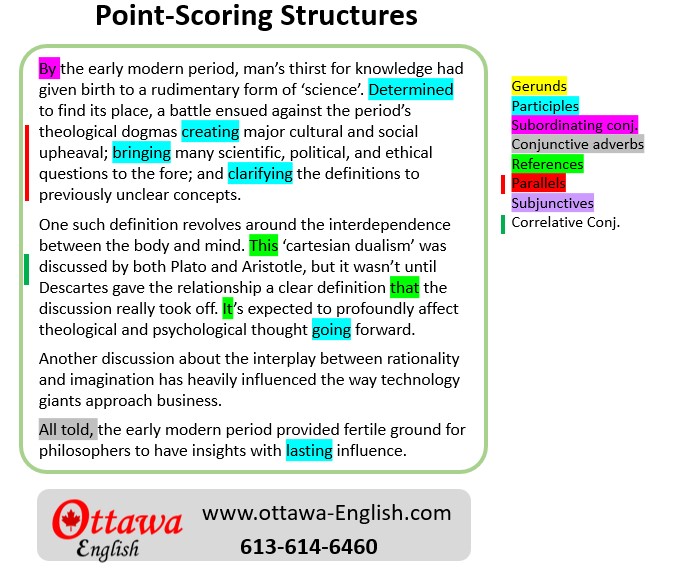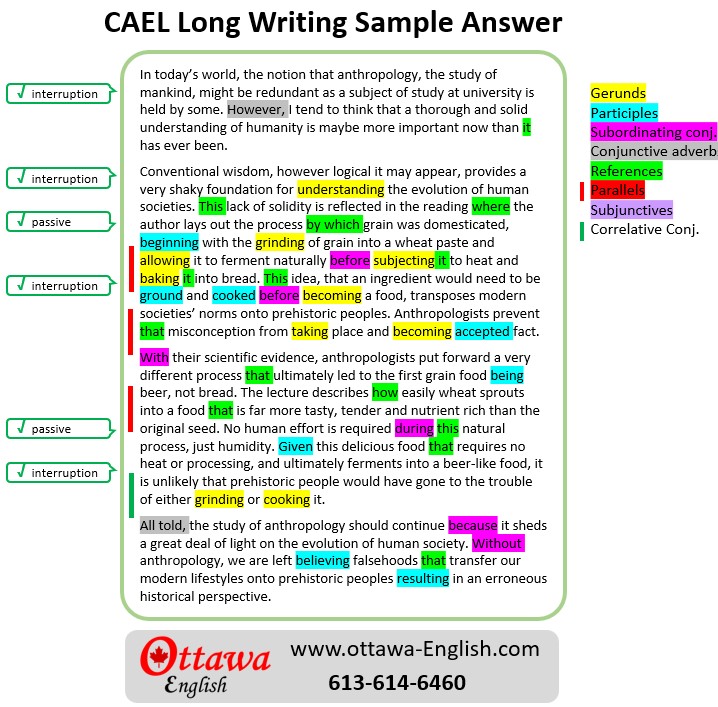CAEL Short Writing Sample
This is a sample response to the the short writing prompt in CAEL practice test 1:
Based on the reading passage, summarize in your own words the early modern period and its lasting influence

By the early modern period, man’s thirst for knowledge had given birth to a rudimentary form of ‘science’. Determined to find its place, a battle ensued against the period’s theological dogmas creating major cultural and social upheaval; bringing many scientific, political, and ethical questions to the fore; and clarifying the definitions to previously unclear concepts.
One such definition revolves around the interdependence between the body and mind. This ‘cartesian dualism’ was discussed by both Plato and Aristotle, but it wasn’t until Descartes gave the relationship a clear definition that the discussion really took off. It’s expected to profoundly affect theological and psychological thought going forward.
Another discussion about the interplay between rationality and imagination has heavily influenced the way technology giants approach business.
All told, the early modern period provided fertile ground for philosophers to have insights with lasting influence.
CAEL Long Writing Sample
The Reading
Scant physical evidence remains of the first human domestication of grain. Still, there is enough to conclude that ancient peoples, motivated by the nutritional value of bread or cakes made of wild wheat, looked for controlled ways to grow it to provide a consistent food supply. Three related discoveries are likely to have led to the introduction of bread as the first grain-based food.
The first discovery was that wheat could be prepared for use by grinding. People probably began consuming wheat by chewing it raw. Because wheat is very hard, they gradually discovered that it was less trouble to eat if crushed to a paste between two stones. The result would have been the ancestor of the drier, more powdery, wheat flour we use today.
From there, it was a short step to the next breakthrough – baking the simplest bread, which required no technology but fire. Loaves of wheat paste, when baked into bread, could be stored for long periods, certainly longer than raw seeds. This kept the food value of wheat available for an extended period after it had been harvested.
Finally, ancient peoples found that, if the paste was allowed to sit in the open, yeast spores from the air settled on it and began fermenting the wheat. This natural process of fermentation caused bubbles to form in the wheat paste, suggesting that it would be lighter in texture and even easier to eat when baked.
The Listening
Conventional Wisdom says that a very primitive kind of bread was the first grain food that human societies ate. But, you know, for the last few decades, there’s been an alternative hypothesis that quite a few anthropologists are starting to give a closer look. That hypothesis says that it was, in fact, beer- not bread – that was the first grain food. Sound strange? Consider a couple of things.
For one thing, you don’t have to grind wheat to make it easier to eat. If you keep it in a moist environment, it naturally starts sprouting, with a new baby plant splitting the hard seed case in half. Sprouted wheat is sweeter, softer, and actually more nutritious than whole wheat seeds – and it would have developed without human effort. In order to discover the usefulness of ground wheat, someone had to get the bright idea of crushing it. To discover the usefulness of sprouted wheat, people just had to let it sit. Which do you think happened first?
Another thing: what turns grain into beer is fermentation, and wheat begins to ferment almost as soon as it’s stored – from water and yeasts in the air. After the wheat sprouted, it would have started to ferment. The process would have been obvious because of the bubbles and foam that formed. People could have experimented by tasting it and discovering the first beer.
And even if you assume that people were already grinding wheat to paste, think about it. The paste ferments and bubbles. Is it likely that early peoples would have thought to fire it before eating? We’re used to cooking our food, but in prehistoric times, the idea that you would take fire to food to improve it for eating wasn’t obvious.
The Essay
In your opinion, should universities continue to offer courses in anthropology or is the subject redundant in today’s world?
In today’s world, the notion that anthropology, the study of mankind, might be redundant as a subject of study at university is held by some. However, I tend to think that a thorough and solid understanding of humanity is maybe more important now than it has ever been.
Conventional wisdom, however logical it may appear, provides a very shaky foundation for understanding the evolution of human societies. This lack of solidity is reflected in the reading where the author lays out the process by which grain was domesticated, beginning with the grinding of grain into a wheat paste and allowing it to ferment naturally before being subjected to heat and baked into bread. This idea that a food would need to be ground and cooked before becoming a food transposes modern societies’ norms onto prehistoric peoples. Anthropologists prevent that misconception from taking place and becoming accepted fact.
With their scientific evidence, anthropologists put forward a very different process that ultimately led to the first grain food being beer, not bread. The lecture describes how easily wheat sprouts into a food that is far more tasty, tender and nutrient rich than the original seed. No human effort is required during this natural process, just humidity. Given this delicious food that requires no heat or processing, and ultimately ferments into a beer-like food, it’s unlikely that prehistoric people would have gone to the trouble of grinding or cooking it.
All told, the study of anthropology should continue because it sheds a great deal of light on the evolution of human society. Without anthropology, we are left believing falsehoods that transfer our modern lifestyles onto prehistoric peoples resulting in an erroneous historical perspective.

